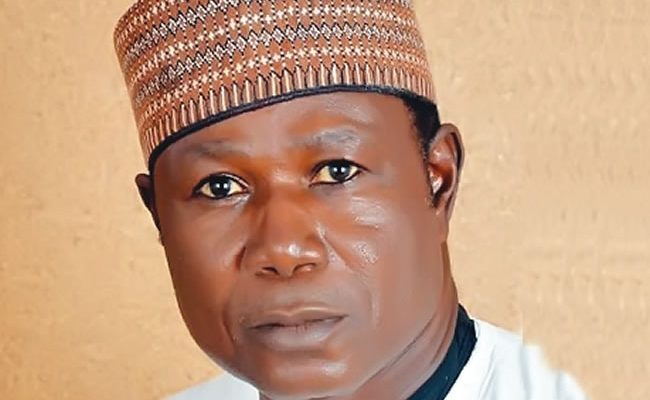The National President of the Middle Belt Forum (MBF), Dr. Bitrus Pogu, in this interview by ISAAC SHOBAYO, speaks on the surge of Almajiri and out-of-school children in the Northern part of Nigeria, the Lukawara terrorist group and other issues affecting the growth of the North.
What do you think should be done to curb the growing population of Almajiri in northern Nigeria?
We need a president bold enough to enact a law mandating that every child must go to school. Any parent who denies their ward access to education should face punishment. In primary school, children can learn Arabic and Islamic doctrine, but it must be mandatory for every child to attend school. This will help eradicate the Almajiri system, where one Mallam gathers children and has them begging for alms in the name of Islamic training. Ironically, the leaders who promote this system are themselves beneficiaries of both Western and Islamic education. Yes, former President Goodluck Jonathan tried by establishing Almajiri schools, but today, those schools are abandoned. We need legislation that mandates education up to the secondary level, with sanctions or jail terms for parents who deny their children this right. Such a measure would address many issues, especially the recruitment of out-of-school children by insurgents who use them as cannon fodder in the chaos we face today.
For instance, during the protests against governance processes, many arrested youths were used as tools of terror. They were given weapons and ordered to burn shops, attack properties, and create havoc. Legislation enforcing mandatory schooling, backed by strict sanctions, can help curb this menace.
We need a National Assembly strong enough to pass such a law and a president courageous enough to declare it as the future of Nigeria. Instead of wasting young lives, they can receive Islamic education as part of a standard school curriculum rather than roaming as Almajiri beggars destined to fall into criminality.
Do you think the established authorities in the North would allow this?
It all comes down to good legislation. If the National Assembly supports it, any governor who disobeys can be held accountable. The problem is unnecessary fear—fear of potential backlash or unrest. This fear has crippled our nation. We must take inspiration from countries like China, which advanced because their leaders were fearless in making tough decisions. India did something similar with medicines; they prioritised local production and development, even at great cost. We need leaders with courage, willing to confront opposition for the sake of national progress. Governors who disobey laws passed in national interest should face sanctions, with immunity removed if necessary. It’s possible to achieve this, but it requires a bold president and a determined legislature.
Regarding the children arrested during the last bad governance protests, some Nigerians are of the opinion that the government was blackmailed into releasing them.
Yes, there are international conventions that prohibit treating minors harshly. However, the government should have investigated who armed these minors and held those individuals accountable. The children should have been rehabilitated, taught how to become productive citizens, and given psychological support. The failure to conduct proper investigations and identify the real culprits was a significant oversight.
The National Commission on Al-Majiri and Out-of-School Children puts the number of such children in the North at 30 million. Is that not scary?
It is. It is quite scary. When you talk about people who are not receiving formal education, they often end up engaging in things like nail-cutting—if that can be called a business—shoe-shining, or simply roaming around. When they grow up, the situation becomes even more alarming. While other nations train their citizens to become future technologists, we are wasting human potential on menial jobs. The statistics is frightening, and something must be done immediately to address the situation.
Above the primary level, there should be some form of education that opens their minds, enables rational thinking, and prevents exploitation. Without it, they may easily be used by elders to cause mayhem—whether as election thugs, participants in violent protests, or tools for other destructive purposes. It’s truly a worrying situation.
Another issue is the emergence of groups like Lukawara, which mirrors Boko Haram. They are reportedly gaining strength, controlling some local governments in Sokoto and Kebbi states. Isn’t this a double tragedy for the Nigerian government, which is still grappling with insurgency since Boko Haram’s inception?
Yes, it is. In fact, there was an attempt to curb this in 2001 during Obasanjo’s regime. The then defence minister and the military crushed a similar uprising in Yobe State before it could escalate. Lukawara, however, was initially invited by some leaders to fight bandits, but now they have become bandits themselves. Those who brought them in should be identified and interrogated. The problem in Nigeria is that some individuals appear to be above the law. Heinous crimes are committed, yet the perpetrators roam free because of their status as former or serving officials. In other countries, corruption alone would attract severe penalties, but here, it’s often waved off. This lack of accountability fosters a free-for-all culture, allowing issues to persist.
Our military is capable of handling these situations but is often restrained by political and operational challenges. Bandits operate openly in some areas, yet soldiers hesitate to engage—not due to lack of ability but fear of repercussions. We thank God that this government appears to have better political will than the previous one. The President must remain resolute and address these challenges directly. Foreign nationals coming into Nigeria to wreak havoc amounts to an invasion. They should be eliminated without mercy. Our military can do it, provided they have strong political backing.
But given the transborder nature of this crisis, do you think the Nigerian government can handle it alone?
No, but cooperation is already in place. If Nigeria plays its part effectively, neighbouring countries will likely follow suit. The problem isn’t the neighbours; it’s us. These groups operate freely in Nigeria, not in Chad, Mali, or Cameroon. I recall a programme where someone from Chad mentioned that Boko Haram operates on the Nigerian side of Lake Chad, not the Chadian side. It’s time for Nigeria to take responsibility. Once our neighbours see us taking decisive action, they will support us.
Recently, an incumbent governor in the north accused his predecessor of promoting banditry; they engaged in a war of words for several weeks, followed by revelation, and nothing was done by the authorities concerned to investigate them…
(Cuts in) The current governor accused the former governor, who is now a Minister of State, of being involved in banditry. The issue lingered for a while, but, as is typical in Nigeria, the story eventually disappeared. It is unfortunate for such statements to be made at such a high level. However, I wouldn’t conclude that the incumbent governor was merely blackmailing his predecessor. There must be some element of truth in his claims. The former governor may not be the only one connected to such activities.
We know, for instance, that under the previous governor of Zamfara and in some other states, negotiations with bandits were common knowledge. Where such dealings occur, compromises are inevitable—it doesn’t require rocket science to deduce that.
Now that President Bola Tinubu has entrusted the accused with the responsibility of resolving this problem, let him focus on delivering results. Whether or not he had a questionable past, he now has the opportunity to make a positive impact.
There is a saying that if you want your valuables protected, give them to a thief to guard—they won’t steal from you. By entrusting this individual with the task, President Tinubu has essentially asked him to solve the same problem he was accused of contributing to. Let him do so effectively.
It is essential that the focus shifts from the past—whether true or false—and toward addressing the issue squarely so that we can achieve peace in Zamfara and the wider North West region. The President has given the military some freedom to operate, and they’ve started showing results. He should ignore threats from certain quarters in the North and empower the military further. With adequate support and autonomy, the military has the capacity to eliminate this menace entirely.
READ ALSO: Jigawa: Police arrest teacher for allegedly sodomising 12 Almajiri children








